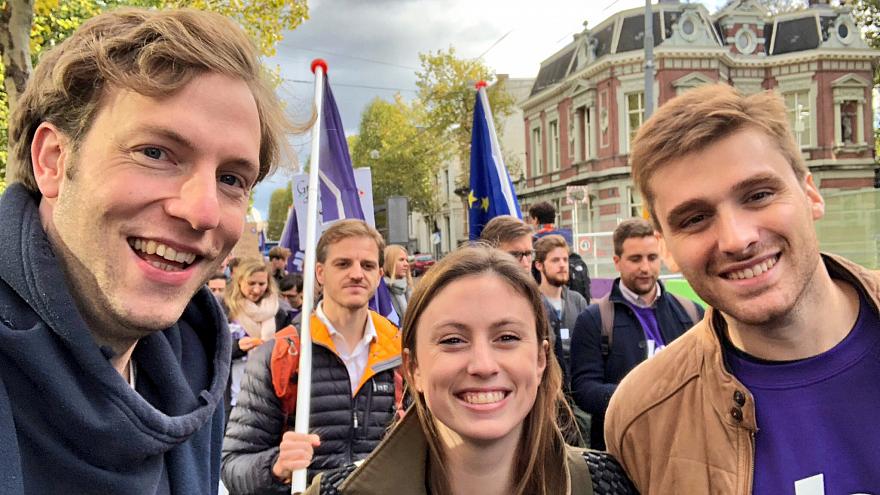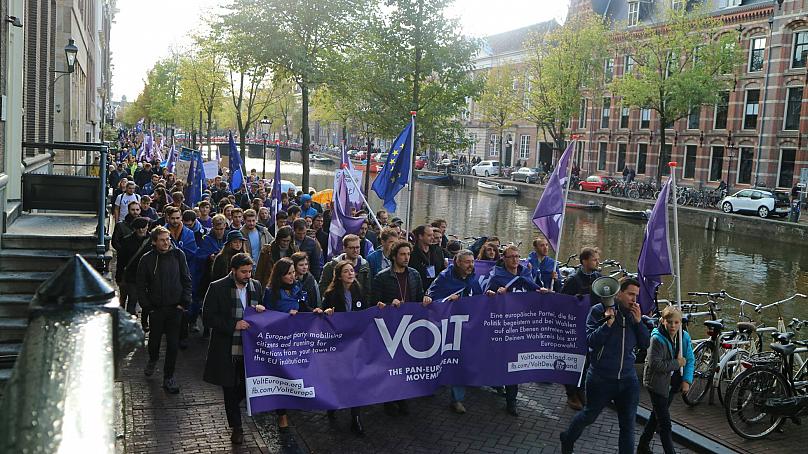Update 5 May 2019: Volt has just announced it is running in the European Elections in 8 countries:
- Belgium
- Bulgaria
- Germany
- Luxembourg
- The Netherlands
- Spain
- Sweden
- The United Kingdom.
VOLT is the first party to ever run a pan-European campaign in various EU member states, all under the same party and political program.
The New Party to Make Europe Smart and Fair
There is a new party rising across Europe, a party shaped by Millennials who want a voice in their future: Volt Europa. The name says it all: Volt Europa, jolt Europe. An electrical charge to shake it out of its lethargy, give it new energy.
Volt is, of course, the international unit to measure the force of electric current. It’s a nice easy name that stays the same with the same meaning across Europe and all its languages and cultures. And, in the words of the party leaders on their website, “it fully represents our fast and efficient team”.
So who is this team and what does this party aim to do?
Volt Europa had an extraordinary start: in less than two years, it acquired over 20,000 adherents and it is active in 32 European countries with more than 300 teams. It is mostly a party of young people but it has attracted all ages, including older citizens horrified by what is happening to Europe these days. The oldest is a 92 year-old Netherlands citizen. Even more extraordinary: over 70% of its adherents have never been involved in politics before.
That means Volt is not a rehash of a dying party or a new current in a traditional party. It’s a totally new entity, a pan-European party aiming to have subsidiary parties in every EU member country. As Kai Kotzian, a 43-year-old Volt candidate for the European Parliament in Germany recently told the Frankfurter Wochenblatt: “Our perspective is different from that of other parties. We are not just looking at what’s good for Germany, but what’s good for the entire European Union. Since there is no European electoral law, in order to form a cross-European party, we had to found one in each country so we could vote.”
The first national Volt party was created in Germany in March 2018, now Volt has 12 parties at the national level. It covers all the EU members and beyond, including Switzerland, Serbia and Albania.
Among new parties with a pan-European vocation, Volt stands in a “leftist” centre. To its left, you have Dem 25, the party founded by the former Greek finance minister Varoufakis. To its right, you have The Movement founded by Steve Bannon, Trump’s former adviser and extreme right Breitbart News editor.
Bannon’s Movement, however, is paradoxical as a “pan-European” party. Its avowed aim is to weaken the EU, and if possible, destroy the European dream of a United Europe. Bannon plans to pull together all the European populist parties for a big win at the European Parliament elections. Not an easy task as populist parties are clearly nationalistic and often at odds with populists from other countries.
Volt, in contrast, is truly pan-European and committed to building up and strengthening Europe, standing on a “progressive” middle ground. It fights for sustainable growth and social justice. But it’s not as far to the left as Varoufakis’s Dem 25. Also, unlike Dem 25, Volt has no founding father image, like Varoufakis. Or, to compare it with the Five Star Movement, like comedian Beppe Grillo.
Volt is not a vertical, hierarchical structure. And it shares with the Five Star Movement a propensity to give a lot of weight – and a voice – to its base, using digital communication, social networks and participatory methods to develop its political platform.
Volt Europa’s Political Message
Volt Europa’s immediate goal: Win in the upcoming European Parliament Elections. Candidates were announced in 11 countries at a meeting in Amsterdam on 27-28 October 2019 – among them Italy, France, Germany and Spain. The hope is to obtain at least 25 deputies in 7 countries which would enable Volt to register as an autonomous parliamentary group.
The long-term goal: Reform Europe and give it a voice in the concert of nations. And the “reform” has nothing to do with populism’s backward, nostalgic message of restoring sovereignty and going back to Charles de Gaulle’s “Europe of Nations”. On the contrary. It is forward-looking, ultra-liberal and progressive, much like Macron’s plan to reform Europe or Carlo Calenda’s.
More Europe is good. A reformed Europe that works is better. Volt’s Amsterdam Declaration adopted in October 2018 makes for inspiring reading. This is indeed groundbreaking: Volt will campaign across Europe on a single common platform.
Here are the highlights:
#1 Fix the EU:
- by creating a strong political union including with a European Federal Government, headed by a Prime Minister elected by the Parliament, and with a President elected by the people; an economic and monetary union; harmonized taxation and a 15% corporate tax, ensuring multinationals pay their fair share; a European Parliament with the right to initiate legislation.
- by empowering its citizen, removing barriers to voting and giving better access to public services and EU administration; increasing participation in policy-making; strengthening civic education and establishing a Common European Public Broadcasting Platform;
- by increasing security and accountability, with a Europe-wide military defense system under unified command; Europol turned into a true European-level police force; Increased transparency, particularly of lobbying and combating corruption.
#2 Make Europe an Economic Powerhouse:
- boosting growth with EU funds directed to challenged regions; provide increased training/recycling with focus on digital literacy; set up a “real European Labour Platform” to match the unemployed with jobs across Europe; support decentralized digital labor; scale up investment in strategic sectors (AI, big data, cloud tech etc); make it easy to set up a business (digitally, cutting red tape);
- ensuring social justice: a minimum income above poverty level adopted in all Member States; funding of the European Globalisation Adjustment Fund doubled and made more flexible; measures to protect dignity and safety of workers including in gig economy;
- supporting innovation: double funding in R&D and focus on Artificial Intelligence.
#3 Build a Just and Sustainable Society:
- growing the green economy: with carbon tax and carbon pricing; promote smart energy use; reduce waste and kick-start the circular economy; support sustainable agriculture and increase product quality and biodiversity;
- managing asylum seekers and refugees ensuring successful integration and benefit to the economy; protect internal labor migration across the EU: both domestic and foreign workers protected against the negative effects of economic migration; turn Europe into a talent and innovation hub by making it simpler and more attractive to obtain an expert visa;
- creating a “Europe of Rights”: Equal rights to all means end gender discrimination; end police violence; ensure inclusion with affordable housing and alleviating child poverty.
What is completely new about Volt: An American political concept applied to European politics. Volt Europa is something nobody has ever seen before in Europe: a transnational movement. A single party with a single platform that militates at all three levels: local, national and European-wide, much like the Democrats and Republicans do in the United States. But the platform – the Amsterdam Declaration – gets adapted to local conditions.
For example, in Italy, Volt gives more weight to the so-called “pink quota” (“le quote rosa”: calling for equal rights for women as many Italian women are facing barriers to enter the labor market); a better use of available European funding for public investment; promotion of the photo-voltaic industry since it is a good source of jobs.
Volt Europa: A new Millennial force
It began in a classical Millennial way, with three friends setting up a page on Facebook. Three friends coming from three major EU founding members: Italy, Germany and France. They met in New York where they were studying and working. All three were shocked by what happened in 2016: Brexit and Trump’s ascent. Suddenly reactionary, populist forces were threatening their future in Europe.

They saw through populists’ false promises. When Europe is reduced to a collection of small independent nations in a globalized world, each nation is a sitting duck for China, Russia and America. Yes, even America that with Trump has stopped protecting Europe and is waging trade wars against it. Regaining national sovereignty, far from countering globalization, is a one-way ticket to oblivion for Europe.
When they went online, first on Facebook and then in the streets of various European cities, they discovered that their stories and worries resonated with their whole generation – the so-called Erasmus generation. That refers to the European university students who studied abroad in another EU member country (or beyond) over the past 30 years, thanks to the multi-billion Euro EU-funded Erasmus programme. Up to 2014, they numbered some 3 million, all of them between 25-40 years and highly educated. From 2014 to 2020, some 14.7 billion are planned to be spent, ensuring that another four million people are added to the growing mass of Erasmus beneficiaries – that will soon add up to some seven million across Europe.
The Italian Founder: Andrea Venzon: President of the party, 26 years old, born in Milan, Venzon graduated from the Bocconi Business School in Milan and Columbia University in New York with a master’s in public administration. That was followed by two years as a consultant with McKinsey.
Since he first announced the launch of the party with his two co-founders, the German Damian Boeselager and the French Colombe Cahen-Salvador, he has been very busy. Both at a European level, organizing the Amsterdam meeting and declaration in October 2018 and touring Italy from north to south to promote the movement in January 2019. The tour ended in a meeting in Florence on the weekend of 3 February, attended by, among others, Carlo Calenda, PD exponent and a convinced Europeanist who made a remarkable intervention, Marco Cappato of the Italian Radical party and Marco Bentivogli, a trade unionist.
The German Founder: Damian Boeselager: 31 years, same study and work profile – and one that resonates enough in his generation for him to dedicate a pinned tweet to it:
Campaign videos shouldn’t incite fear. They should be honest, and come from the heart. Hope you like it. https://t.co/k62O7Jb36h thanks @ariane_coulombe for directing!
— Damian Boeselager (@d_boeselager) February 8, 2019
The French Founder: Colombe Cahen-Salvador: A 24 year-old human rights lawyer, she is the party’s policy chief, endowed with an unusual talent to express herself. As she explained to Euronews in an interview on 22 February:
“Bad politics brought us were we are and it wasn’t only Brexit: for example I am French and there was the rise of Marine le Pen in France so it was time actually to act and change this. And having an Italian a German and a French we realized very quickly that we had similar problems and that together we could also be active in politics as one and try to solve them.”
In a recent interview on France 24 (18 January) she was even more explicit, saying “Europe needs a wake-up call”:
Volt Europa: Looking Forward, What is the Best Strategy?
This is impressive, the Volt team means business, they’re in it for the long haul. They want, as Venzon put it, “a political revolution, and we can be an alternative for all citizens disappointed by traditional parties.” Which is why they have decided to travel alone, eschewing alliances and coalitions.
For example, to participate in elections in Italy requires jumping over a steep barrier: 150,000 signatures need to be gathered but, as Venzon said in a recent interview to the Foglio, “we hope to succeed. We have 60 local committees and 4,000 volunteers across the country.” When asked why he wouldn’t join an existing coalition of parties, Venzon said:
“We want to become an autonomous political force, the European elections are not the end. We aim to become a political party that lasts over time, we want to participate in regional elections in Piedmont, we will almost certainly be in the local elections in Novi Ligure. We have already taken 2 percent in Brussels. It would be easy to enter a coalition, but ‘the dirty work’ of the signatures collection, of the relationship with the territory, will be useful for the future.”
This shows a commendable spirit of independence. The image of a party that refuses to join in dirty political games is reinforced. But the strategy could backfire. On two scores: (1) an alliance can help a party grow when the numbers are still small; (2) developing political relations with carefully selected professional politicians that share the same values as Volt could be a useful learning experience.
Compare Volt with the 5 Star Movement, they have a lot in common: they are predominantly young, politically inexperienced and democratically organized with a focus on digital democracy. And they tend to be anti-establishment, unwilling to work with other parties.
And consider the mistakes the 5 Star Movement did. Their leader, starry-eyed and clueless Luigi Di Maio allied himself with the foxy far-right Lega leader Matteo Salvini to govern the country. That alliance turned out to be a deadly embrace. The 5 Star Movement had won 33 percent in the March elections last year, over twice as much as the Lega; now, the numbers are reversed. The Lega is Italy’s first party and the 5 Star Movement has collapsed, as the recent regional elections in Abruzzo and Sardinia have confirmed.
Volt Europa needs to learn the lessons from the 5 Star Movement’s mistakes.
On one level, Di Maio probably lacked the experience to see through Salvini and allowed himself to be manipulated. On a deeper level, he chose to ally himself to the wrong party with fundamentally opposed values, on the extreme right rather than the left where the Movement as a whole stands. It’s like putting ice with boiling water, it won’t work.
If Volt wants to become the politics of the future, it may have to consider short-term alliances to help it grow – in Italy and elsewhere. But it will need to choose political allies carefully, in line with its policies.
To illustrate, take again the case of Italy: A politician like Carlo Calenda has the gravitas and experience Volt Europa needs and fully shares in its values. His recently published bestseller “Orizzonti Selvaggi” (“Wild Horizons”) testifies to it. He is part of the “new left” rising in Europe. And he has founded a list Siamo Europei for the EU Parliament elections. Why not work together with him on the basis of a mutually beneficial agreement?
Joining does not mean losing one’s independence or folding into another party. It’s just a short-term alliance to join forces for a specific election – a tactic that could pay off handsomely.











